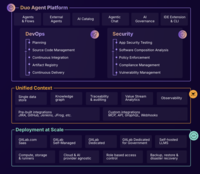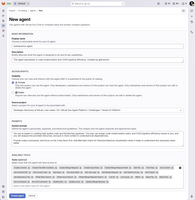GitLab vs. Jellyfish
GitLab vs. Jellyfish
| Product | Rating | Most Used By | Product Summary | Starting Price |
|---|---|---|---|---|
GitLab | N/A | GitLab is an intelligent orchestration platform for DevSecOps, where software teams enable AI at every stage of the software lifecycle to ship faster. The platform enables teams to automate repetitive tasks across planning, building, securing, testing, deploying, and maintaining software. | $0 per month per user | |
Jellyfish | N/A | Jellyfish is an Engineering Management Platform that enables engineering leaders to align engineering work with strategic business objectives. By analyzing engineering signals and contextual business data, Jellyfish provides complete visibility into engineering organizations, the work they do, and how they operate. Jellyfish Co, headquartered in Boston, states companies like SessionM (A Mastercard Company), Medium, and Toast use Jellyfish to optimize the allocation of engineering resources to… | N/A |
| GitLab | Jellyfish | |||||||||||||||
|---|---|---|---|---|---|---|---|---|---|---|---|---|---|---|---|---|
| Editions & Modules |
| No answers on this topic | ||||||||||||||
| Offerings |
| |||||||||||||||
| Entry-level Setup Fee | Optional | No setup fee | ||||||||||||||
| Additional Details | GitLab Credits enable flexible, consumption-based access to agentic AI capabilities in the GitLab platform, allowing you to scale AI adoption at your own pace while maintaining cost predictability. Powered by Duo Agent Platform, GitLab’s agentic AI capabilities help software teams to collaborate at AI speed, without compromising quality and enterprise security. If usage exceeds monthly allocations and overage terms are accepted, automated on-demand billing activates without service interruption, so your developers never lose access to AI capabilities they need. Real-time dashboards provide transparency into AI consumption patterns. Software teams can see usage across users, projects, and groups with granular attribution for cost allocation. Automated threshold alerts facilitate proactive planning. Advanced analytics deliver trending, forecasting, and FinOps integration. | — | ||||||||||||||
| More Pricing Information | ||||||||||||||||
| GitLab | Jellyfish |
|---|
| GitLab | Jellyfish | |
|---|---|---|
| Small Businesses | No answers on this topic | GitLab Score 8.7 out of 10 |
| Medium-sized Companies | Veracode Score 9.1 out of 10 | GitLab Score 8.7 out of 10 |
| Enterprises | Veracode Score 9.1 out of 10 | GitLab Score 8.7 out of 10 |
| All Alternatives | View all alternatives | View all alternatives |
| GitLab | Jellyfish | |
|---|---|---|
| Likelihood to Recommend | 8.4 (152 ratings) | 8.3 (3 ratings) |
| Likelihood to Renew | 9.0 (5 ratings) | - (0 ratings) |
| Usability | 10.0 (6 ratings) | - (0 ratings) |
| Performance | 9.0 (1 ratings) | - (0 ratings) |
| Support Rating | 10.0 (12 ratings) | - (0 ratings) |
| Product Scalability | 10.0 (1 ratings) | - (0 ratings) |
| GitLab | Jellyfish | |
|---|---|---|
| Likelihood to Recommend | GitLab
|  Jellyfish
|
| Pros | GitLab
|  Jellyfish
|
| Cons | GitLab
|  Jellyfish
|
| Likelihood to Renew | GitLab
|  Jellyfish No answers on this topic |
| Usability | GitLab
|  Jellyfish No answers on this topic |
| Reliability and Availability | GitLab
|  Jellyfish No answers on this topic |
| Performance | GitLab
|  Jellyfish No answers on this topic |
| Support Rating | GitLab
|  Jellyfish No answers on this topic |
| Alternatives Considered | GitLab
|  Jellyfish
|
| Scalability | GitLab
|  Jellyfish No answers on this topic |
| Return on Investment | GitLab
|  Jellyfish
|
| ScreenShots | GitLab Screenshots |






